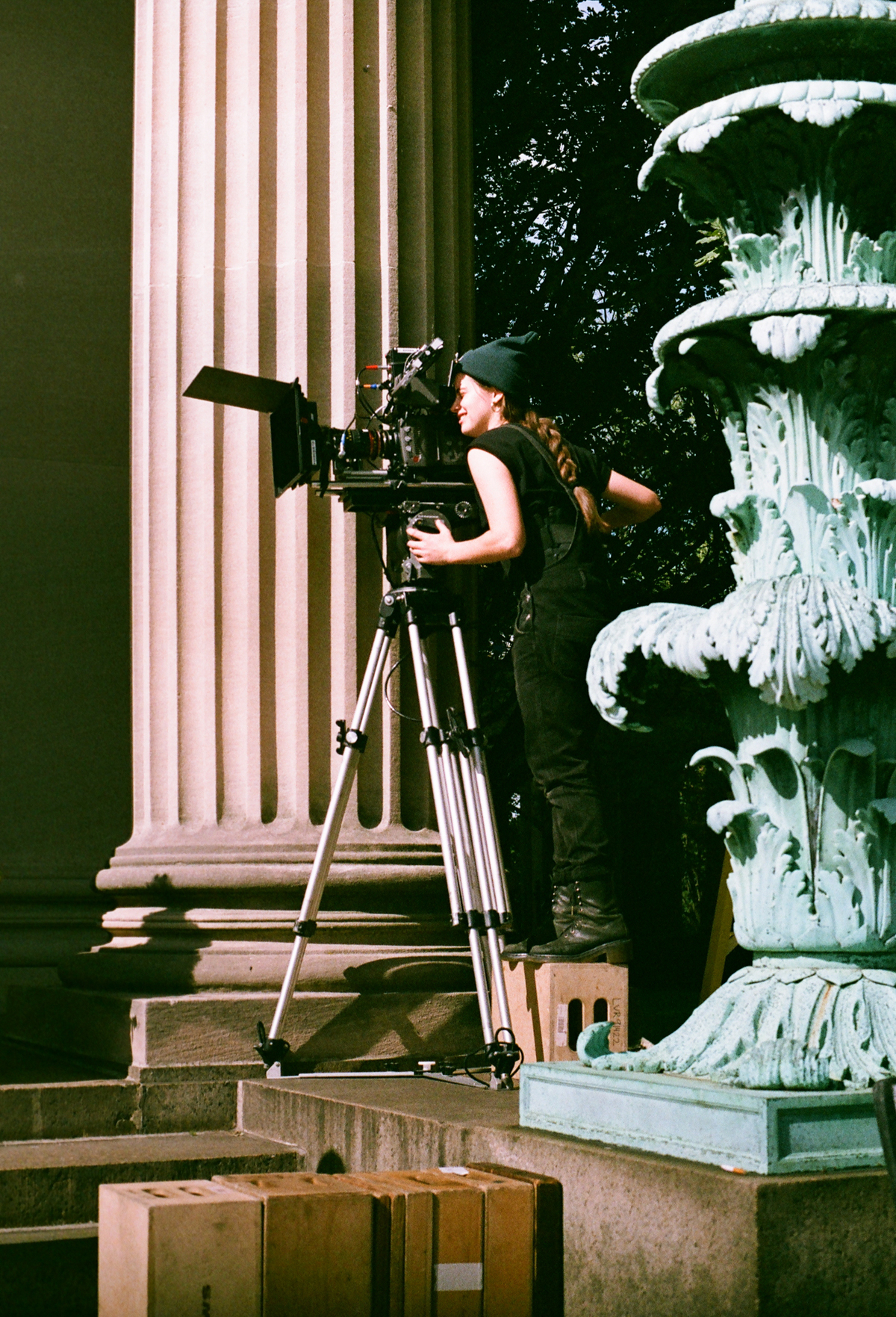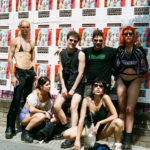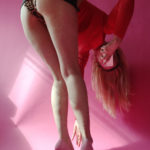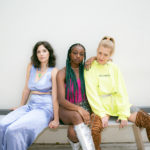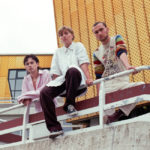When did you come to Berlin and have you always been a photographer? Sabrina: I…
Julia Pitch (@pitch__please)
interview with the New York based filmmaker28 July 2020
Julia Pitch (@pitch__please) is a New York based filmmaker committed to telling nuanced stories that explore themes such as feminism and femxle sexuality. Through relationships that challenge society's conventional power dynamics, characters encounter complex problems that press their vulnerability and explore their humanity.
Julia’s visual style can be seen through her use of light and composition, which is heavily influenced by her fine art background and training as a cinematographer. In 2019, she was the Director of Photography in her first feature film, The Country Club. Working collaboratively through filmmaking, she expresses her passion for big picture thinking and exercises her innate ability for storytelling.
We speak to Julia about how she started out in the industry, the relationship between her career in the film industry and social media, as well as the struggles (and triumphs) from being a femxle film-maker in a male-dominated industry.
The quality and artistry of your recent work is pretty impressive. You also work with some pretty big equipment! Do you work with an Assistant Camera and a team? Or are you a lone cinematographer-editor that likes to keep as much work as possible in their own hands?
Julia: Short answer: I do both! I absolutely love collaboration. That’s why I got into film in the first place. Realistically, there are way too many aspects of film for me to master all of them. So, when I see an area of weakness that I have, my first thought is to find someone whose portfolio in that department is innovative, and team up with them. Although I edit, I particularly love to bring on another editor for post-editing. I think having a pair of fresh eyes looking at footage opens the door for more creative conversations.
The Instagram post you mentioned was taken on the set of my first feature film, The Country Club. My crew was two camera assistants, a gaffer, a key grip and a swing, as well as a steadicam. I’ve gotten to work with a range of equipment, but I’ve found that bigger is not always better! I think of myself as a creative but that doesn’t mean I don’t pay attention to the numbers. My advice to anyone getting into film is to understand the costs of production and how to get the most out of any budget. Costs dictate creativity.
That being said, as a director I know enough about all of the departments to be able to do them myself, if needed. When I was just starting out, I was eager to do work that felt true to my interests, and that meant creating my own projects that had no budget. I had to direct, shoot, edit, color and sound mix everything because of budget restrictions. That experience shaped the tone of my current work. Figuring out my taste in that way has helped tremendously.
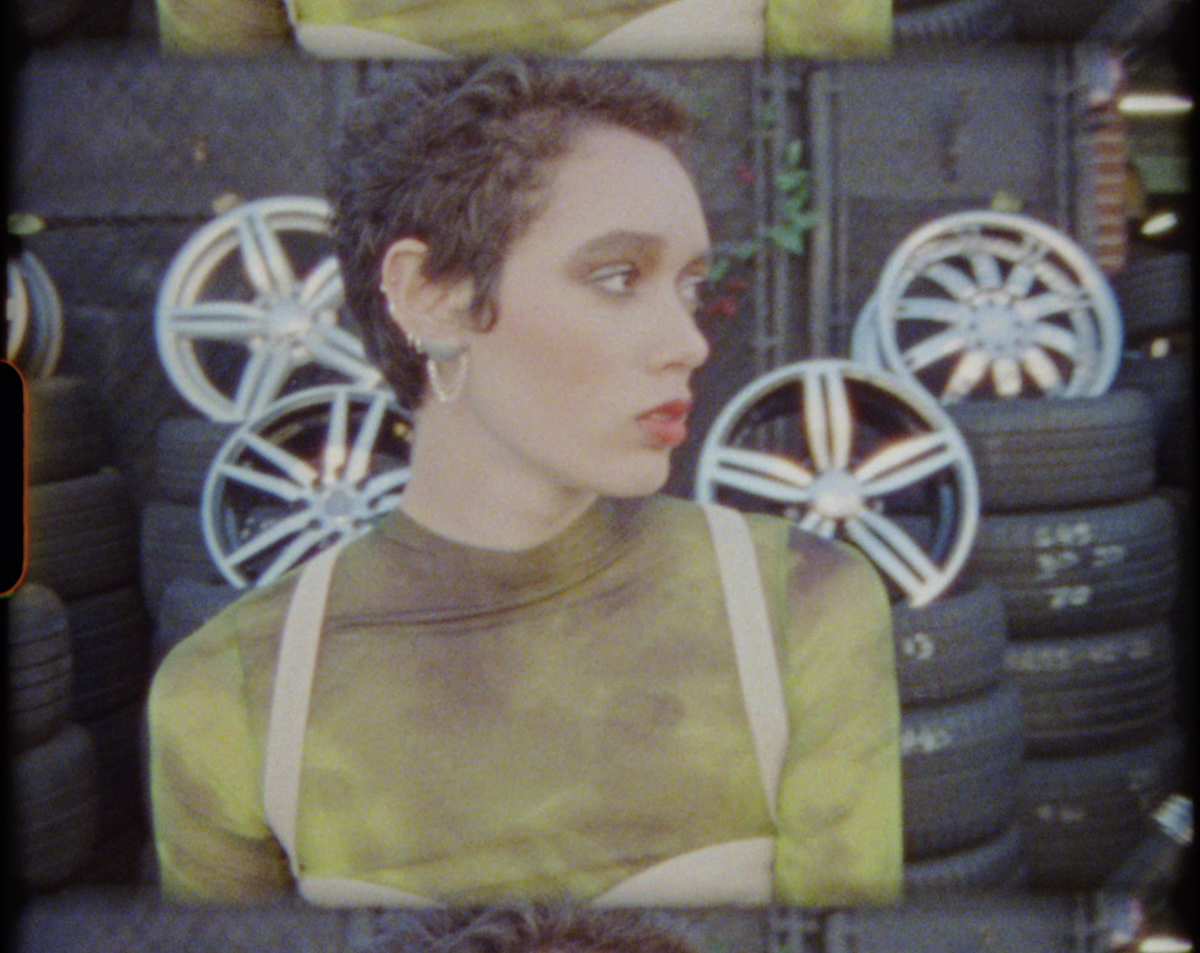
All the work samples on your website focus on topics around feminism. For instance the back to the beach campaign, which was an ode to the femxle body of all sizes. Can you tell us about the topics, feminism and others that you want to address with your work?
Julia: My goal with the work I direct is to marry raw emotions and beautiful images. I try to make the message of each piece feel universally relatable, despite staying true to the unique subjects. I enjoy working with confident womxn or LGBTQIA+ individuals because I want to add to the growing library of imagery that portrays these subjects in confident ways. I embrace the processes, struggles or personal journeys, but I also search for silver linings or positive takeaways when I can. I also hope to make work that airs on the side of dark comedy in the future. I’m currently working with SLMBR PRTY as a director, which has been great because they share similar views
I’ve found that because I’m a womxn, a lot of the opportunities I’m presented with are related to womxn’s issues. The projects are almost always exploring motherhood, sexual assault, equality in the work place, and body issues. At times, it can feel like I’m a token hire. Sure, when production wants to create an all-female set, I get hired, but then those producers don’t call for jobs unrelated to “womxn’s issues”. It can definitely be frustrating. Let’s be honest, it’s 2020, and they know it’s a bad look to hire a man to direct these jobs, but, when diversity isn’t involved in the nature of the project, producers go back to defaulting to not considering the diversity of their set. I would kill to shoot a car commercial and use all the dope gear
Needless to say – misogyny is still a problem in the creative business. In spite of this, you seem to have made it quite far at a young age and all your posts still seem very optimistic. What’s your secret? Do you have any advice for young women pursuing your path?
Julia: Yes, I still encounter misogyny. But, I’m optimistic because I love what I do! I get hired to lens the world as I see it? What an absolute privilege. Most days are not glamorous, but I try to find something to be inspired by in every job that I do, even if it’s a corporate job.
The beautiful thing about film is that one can be inspired by so many different aspects of it. Someone could listen to birds chirping and could imagine pairing images with their sounds to tell a story. I encourage everyone to stay inspired. There are endless possibilities to strike a match which will turn into the fire of your work, so be present. The way you perceive the world is unique, and you should have confidence in your vision.
My second advice is to young womxn: do the research and know your shit. If you want to be treated as an equal, take gender out of the equation for a moment. You simply need to be the best person for the job. If you want to be in charge, the only way to keep up in the boys club is to be just as knowledgeable about gear, if not more, and engage in industry conversations. I have had a really hard time finding a mentor, so I bought a subscription to American Cinematographer and learned how DP’s (short for Director of Photography) talked.
Thirdly, what you are feeling isn’t imposter syndrome. You have value and getting paid to learn on the job happens in every field. You have to be willing to take opportunities that are out of your range of experience to grow as an artist or filmmaker. If you are not uncomfortable, you are not growing. A few years ago, I once saw a guy very confidently accept a job using a gimbal (a special type of camera gear) he has never used before. I was shocked he would risk the production, but he told me he was going to pay out of pocket, rent the gear the day before the shoot, learn how to use it and do it. Most women I know wouldn’t do that, they would be honest and say they didn’t know the gear in question. A lightbulb went off in my head that day.
Lastly, listen, speak up and hold your ground. The person who talks the loudest doesn’t always have the best ideas. A good director or DP is a good listener. They are listening to the vision of the client, irector, or producer and they execute that. They listen to the needs of their crew, and they not only accommodate but also foster growth. If you don’t value the people around you, they will feel it. However, when you’re in charge, you have to trust your own instincts, and have a plan to steer others on that path.
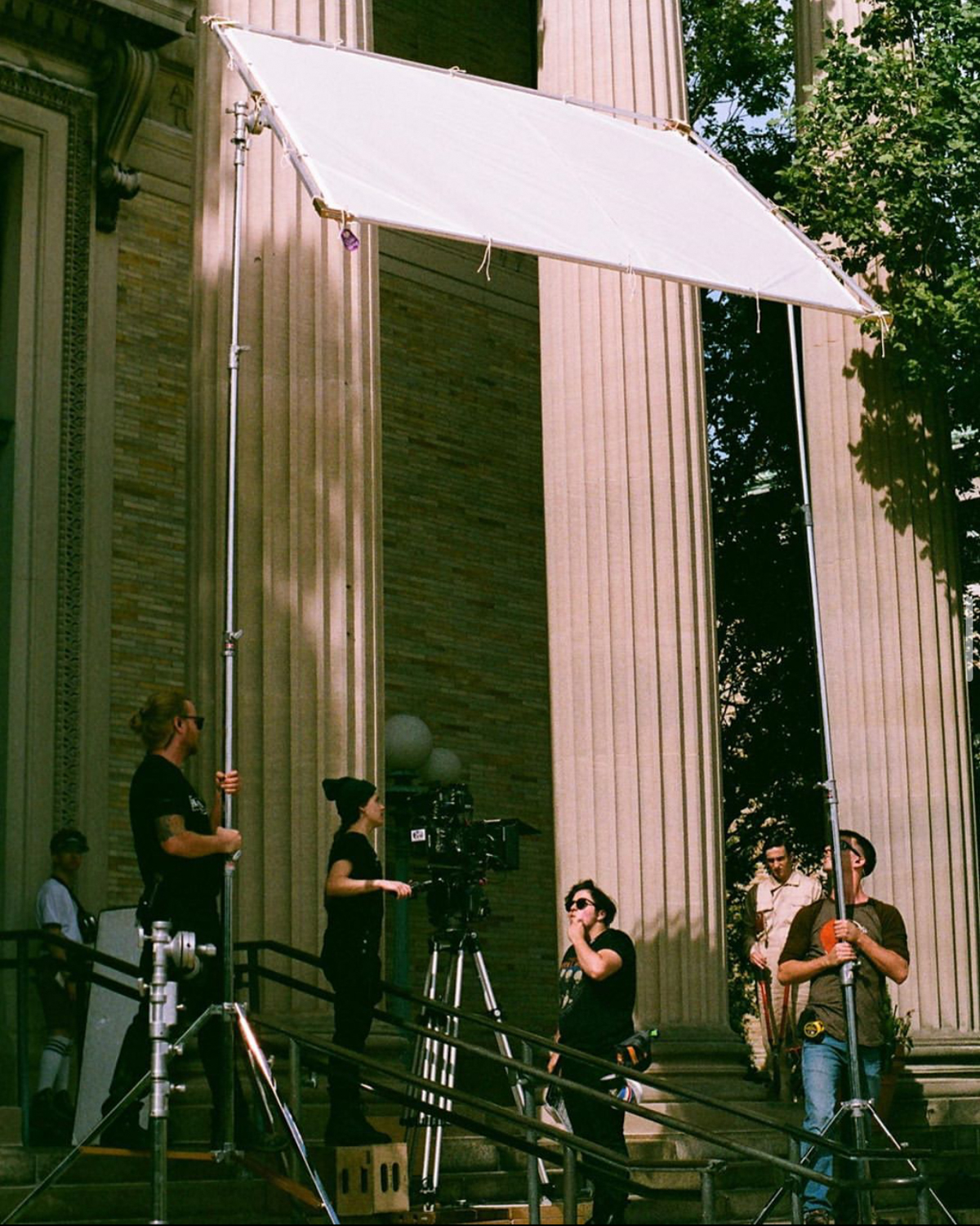
There are a growing number of femxle DP’s working in the field, but they were once very rare. A historical example of such womxn is the collaboration between film-maker Claire Denis and DP Agnes Godard, which produced insanely sensual and brutal images such as those within Beau Travail. Do such womxn inspire your work?
Julia: What a great reference. They paved the way and for that I will forever be grateful. I think women are inherently empathetic and observant, and those traits translate well into filmmaking. To be honest, I don’t favour cinematographers because of their gender. I look at the work and if they happen to be a woman, that’s great. I’m extremely moved by films directed by women, about women. When I first saw Fat Girl by Catherine Breillat or Vagabond by Agnes Varda, I knew those subtleties could have only been written by a woman, and I became obsessed with both directors. It’s more obvious when scripts are written by someone other than a cis male, and I beg for more diversity in the writing rooms just as much as I do on the crew.
Can you tell us about your early experiences? How did you start out? Did your entry into the film industry begin as an assistant DP?
Julia: Ah! Time flies! And each “level” I get to, I still feel like I’m the new kid on the block.
After school, I was living in Baltimore, but I knew New York was the next step for me. Although extremely supportive, my dad said, “find a job or come back to Texas and live at home”. He wasn’t going to front my expenses to gallivant around New York, a city in which I only had a handful of acquaintances. So I really hustled to get in front of people for an interview.
When I was interviewing for a position to work at VICE in Brooklyn, I received an email at 10:30am asking if I could do a follow up interview at 4:30pm that afternoon. I checked the Bolt Bus schedule and was able to make the 4 hour trip in time for the meeting. This happened countless times. Finally, I was offered positions at both VICE and Refinery29, and ultimately accepted the latter. They wanted me to start immediately, which was great… except I couldn’t afford an apartment. I moved to New York with a suitcase, and lived on a friend’s couch for two months before I could afford a place of my own. Then, when I was finally able to afford a room, I could only afford an air mattress. I believe if there is a will, there is a way.
Working at Refinery29 had a huge impact because I was able to observe how dozens of talented women in more senior positions held themselves. We need more diversity in the workplace so mentorships like these are more commonly available.
There, I was expected to develop, produce, shoot, and post-produce my own work. On a technical experience, this was great, because I had unlimited access to gear I couldn’t personally afford. I could work with a subject and a camera allowed me to slow down and play around with compositions in a way I’m not sure I would have if I had a crew of people watching me. I did personal projects on the weekends, too. This one-man-band got me the chance to work on On The Record, a documentary now premiering on HBO. I DP’ed five days on that production, mostly with just an AC (short for camera assistant) and an audio operator.
After I left Refinery29, I wanted to learn more about gear. This meant stepping down from shooting. I started AC’ing for more established DP’s, to see their approach to lighting and running extremely large sets. During this time, most of my mentors were talented, male DP’s that were rooting for more women in the camera department and on set.
Pre-pandemic, I was Directing, DP-ing, OP-ing, and assisting. I know I’m at a crossroads where people want me to choose one. But I can wear a lot of hats, and I care more about the project than my role sometimes. If I think I will learn a lot or if a project is going to be creative or politically stimulating, I will jump at the opportunity. The key to doing that is knowing my place in the role I was hired to do, and to respect the hierarchy of positions.
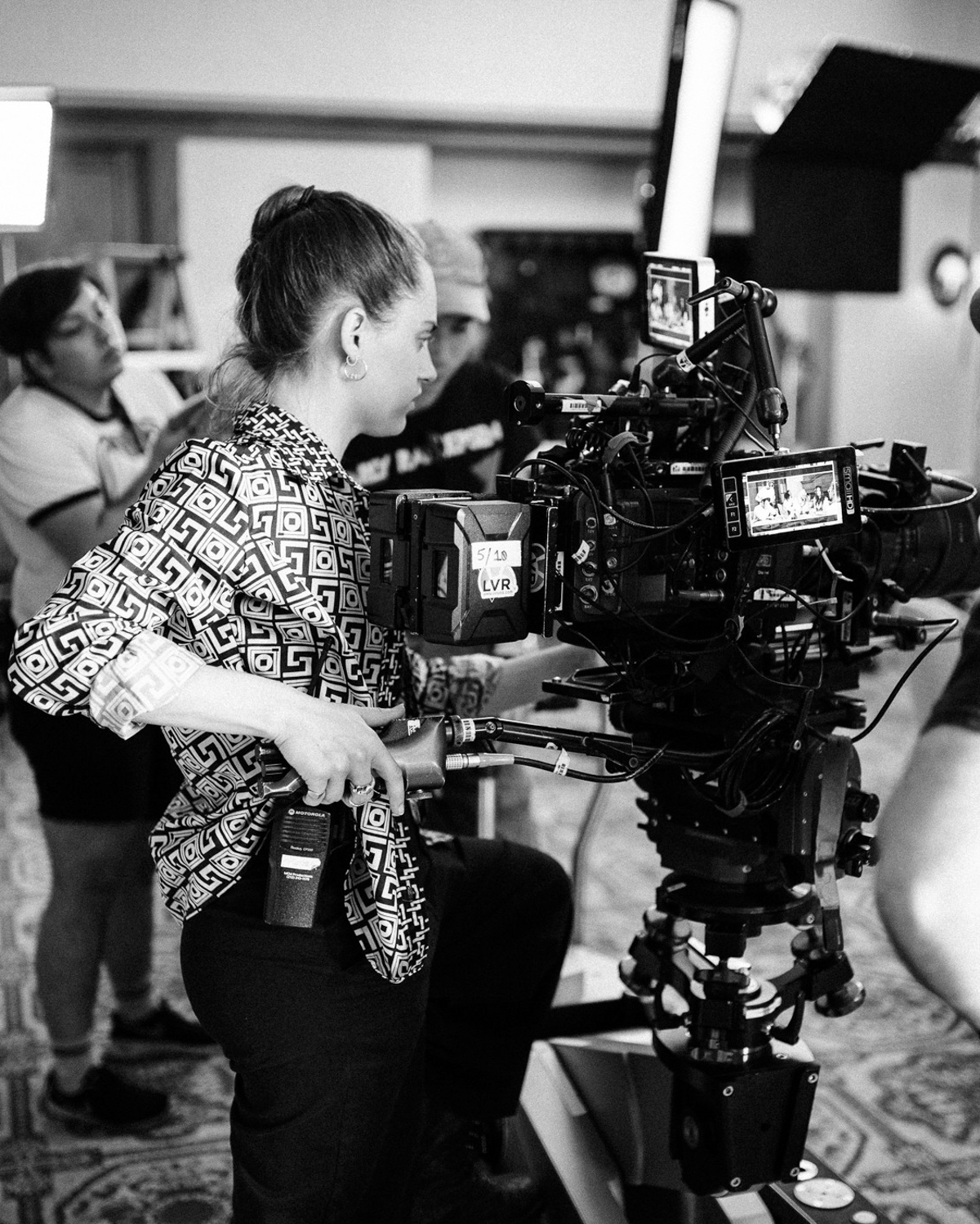
What kind of camera(s) do you work with and do you have a favourite type of lens?
Julia: I try to be resourceful with what I can afford from project to project. In terms of lensing, I usually have to work so quickly that I don’t want to allot the time to switch prime lenses constantly. I love the Angenieux Optimo 15-40mm zoom lens for distorting subjects with a wide angle lens close up. Contrastingly, I really enjoyed working on the 24-290 Angenieux Optimo lens I shot The Country Club on, because I’ve found a lot of comedy in zooms. I work on whatever camera body I can get, but I always prefer the body to be an ARRI camera, they are simply the best. I wish I could shoot more on film because I prefer the analog process in which film captures light. I’ve also done a lot of lo-fi work with VHS because I think the nostalgic grain and gritty quality is the poor man’s version of using film.
Do you experiment on set or is everything pre-planned?
Julia: When working with others, I always have a game plan. This helps to communicate what you’re going to do before the shoot, so your collaborators can get on board and bring their A-game too. It also allows others to poke holes in what may not work for whatever reason, and it’s way better to have those conversations beforehand so the set itself can run in a healthy way. I went to RISD (Rhode Island College of Design) for illustration, and I enjoy storyboarding when I can. I storyboarded The Country Club prior to shooting.
That being said, for multiple reasons, all planning can go out the window on the actual shoot day. Filmmaking is about being present, adaptable and thinking on the fly. And, I try to do whatever the director or client wants first and efficiently, so with leftover time we can play. I’m lucky that when a lot of people hire me, they trust me to do my thing, and experimentation is part of it. I recommend reading Catching the Big Fishby David Lynch.
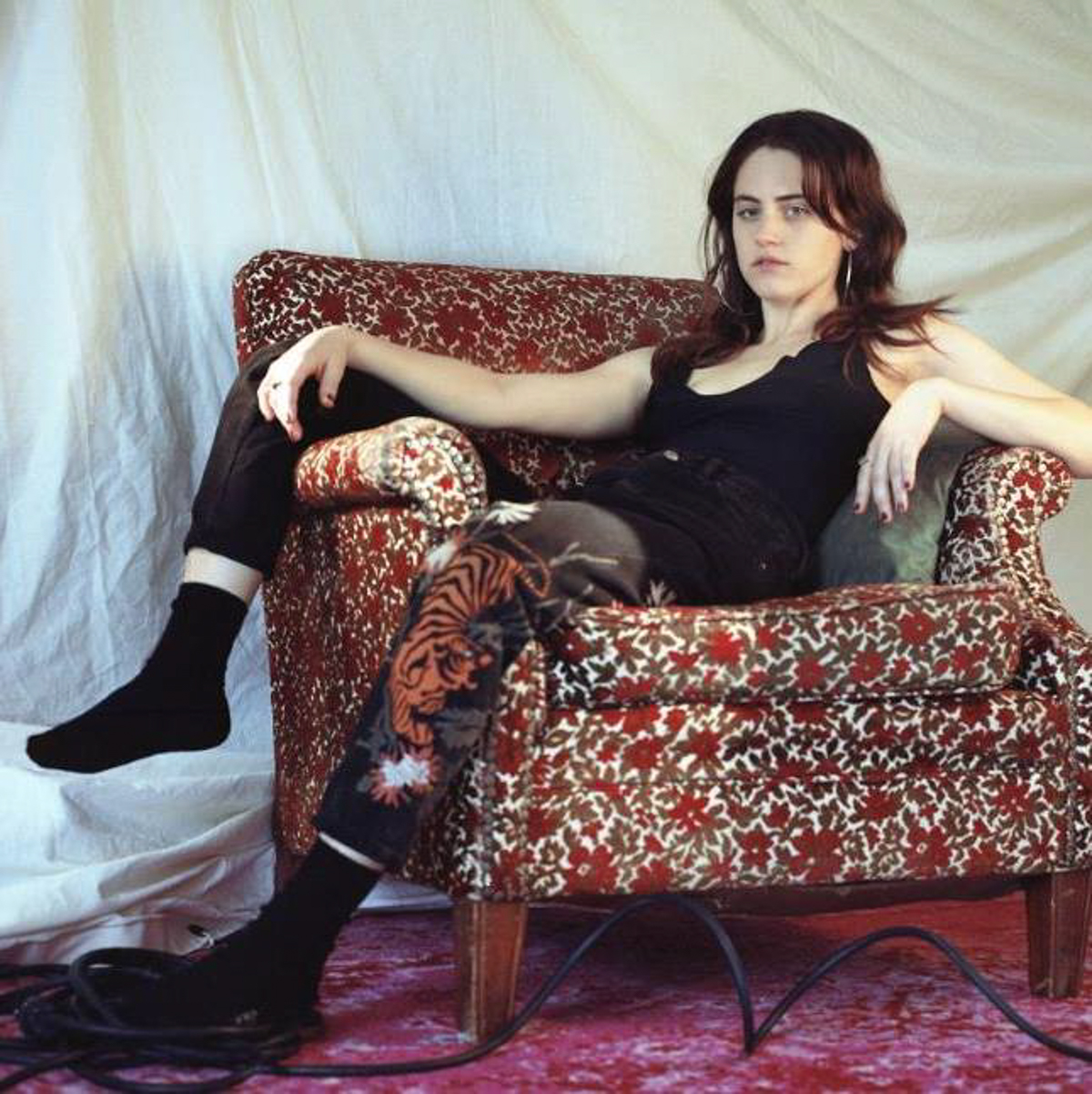
We are always excited to see womxn behind the camera who essentially become part of their work. Your instagram is full of portraits and pictures of yourself and in company. Is there a political purpose in being both in front and behind the camera lens, or is that just the nature of performing on social media?
Julia: This is a great question, and honestly, something I talk about frequently to other creatives and also my therapist. Although, my therapist is too old to get the constructs of social media so that was a short lived topic. It brings me stress because we are three dimensional people, and instagram is two dimensional. There is no way I can capture every aspect of myself; the good and bad in an online profile, yet, that is how some people may only know me. However, social media is a necessary evil. I participate because as a freelancer I have to, and let’s face it, if I didn’t, you wouldn’t have seen my work and I wouldn’t be being interviewed.
I put photos of myself on my instagram because who I am and what my lifestyle choices are; all influence the way I see the world. Even though I stay behind the camera, I want my point of view to transcend in the footage, and I think putting myself out there helps people understand my voice. I am queer but I am femine. I think there is power for people to see a 5’3” feminine woman doing a really physically strenuous job.
I’ve also had young women reach out to me and ask me for advice, because they see what I’m doing and they want to do it. That’s really cool. I didn’t have the same instant access to seeing women doing what I wanted to do through social media when I was younger, and that actually resulted in me deferring earlier projects to men to act as DP, while I produced. I’m glad I got over that. Watching more successful women on social media, like Rachel Morrison, Katelin Arizmendi, Julia Swain, and Rina Yang, have given me hope and a goal to work towards.
What do you think of the vertical Tik-Tok-format as opposed to the classic 16:9 ratio? Do you experiment with formats?
Julia: I don’t have a Tik-Tok, but I appreciate it. Some of the ideas I’ve seen there are extremely impressive. Being able to execute relatable content to mass audiences under 10-15 seconds is a skill. I do experiment with formats though, for example, my work with Janelle Monae, Teyana Taylor, and Blanca Padilla were all good exercises in digital portraiture.
Knowing formats comes with the territory of being an expert in one’s field and knowing your audience. When I see someone deliberately choosing to use a 4×5 or 9×16 image instead of 16×9 footage, that intention can invite a good conversation. This is a time where the rules to video are being broken.
In 2017 you produced the music video “Control”, which is a collaboration between Dorian Electra, Zuri Marley, London Jade, K Rizz, and Chynna. The song deals with the undoubtedly downplayed repercussions of the reproductive rights struggle in the U.S. for people of colour, trans, and immigrant communities. Can you tell us about how it came to life and what it was like combining so many strong womxn’s voices in one project?
Julia: That project was a ton of fun! When I worked for Refinery29, they contracted Dorian Electra to produce some of their earlier work in regards to gender politics. I think Dorian, Weston Allen and Mood Killer are absolute creative geniuses. They combine gender politics with strong, innovative visuals, and they each have alter egos. I asked my Refinery 29 manager to work with them. This goes back to me choosing to work with creatives on projects that I stand for, over what my role is. You have to do that type of stuff to work with the community you want to be a part of.
I learned a lot from them, as they are so detail oriented. They made their earlier work look extremely professional with almost no resources, and the shoot itself was extremely DIY. The location was a gay club that – the day before our three day shoot, we found out had a mass orgy scheduled to last until 7am the Friday night before. Our start time was 8:00 a.m. The owner of the club basically admitted he would probably pass out, and didn’t give a thought to cleaning. So that would leave us one hour to clean up the party. Picture condoms everywhere, prior to shooting, and we were already maxed out on our budget. This would be one of the more hilarious and absurd problems I will ever encounter as a producer.
Working with that many talented queer people and POC womxn; all who were under twenty-five years old at the time, was invaluable. Shoots so diverse are sadly hard to come by. It showed how one can cultivate a certain safe space and energy on set by surrounding themselves with other like-minded people. We all respected and valued each other. And when I have the opportunity to hire, I try to replicate that energy.
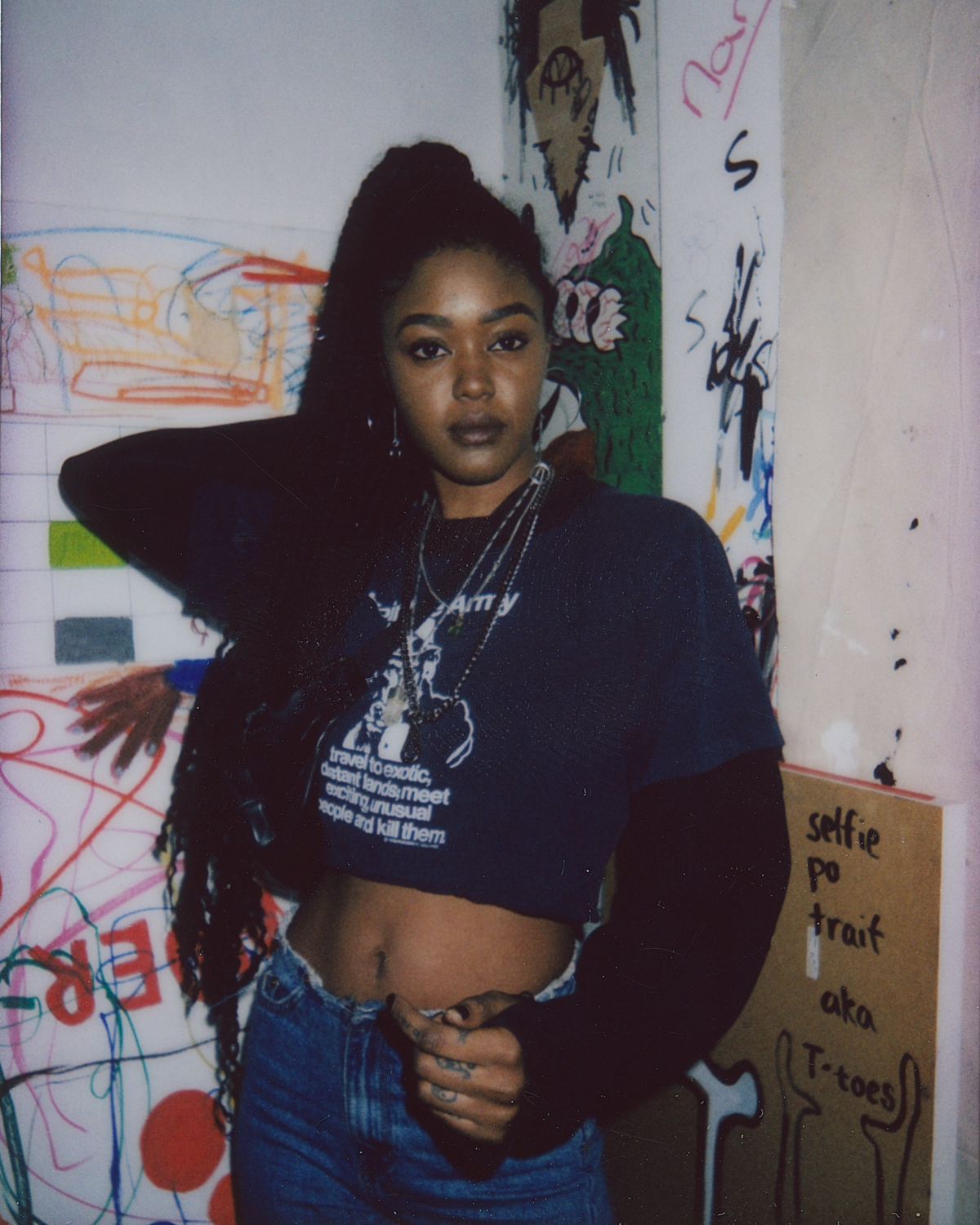
On a very sad note. The incredibly talented, courageous, and inspiring singer songwriter Chynna, who featured in the music video you created, passed away very recently. We commemorate her and grieve her loss. Her music was a huge inspiration and comfort for so many fans and followers. You knew Chyna personally, as you mentioned in a post, and we would love to know if you can say anything about her, thoughts about being the empowering woman that she was, for we would love to give her the final attention of this article.
Julia: Yes, I met Chynna in 2016 from reading a profile piece about her, and we became friends, and later she worked on Control. Rest in power babe! Chynna was extremely resourceful and self sufficient. She was successful as a musician in a male dominated field,because, like I said earlier, let’s take gender out of the equation, she simply was just really good. Womxn or not. She told me that she didn’t have time to cater to the male ego. Men were either going to like her work and want to collaborate, or walk the other way. Chynna was very smart, could level intellectually, and didn’t engage in things that she didn’t seem fitting. Not trying to force pleasing people allowed for less bullshit, and more space for productive relationships to form. Chynna was pretty true to herself down to what food she ate. One time, I made her a veggie burger, and laughed at me and threw it away, because she hated it and wanted real meat. I think Chynna’s raw honesty helped shape the persona you may know. That’s brave, because I spend a lot of time trying to please people. I think her confidence was contagious.
Chynna stayed at my house for a few weeks, and she was always watching the news, films, and writing. I was able to go to three of her studio sessions, and she made the whole process seem effortless, but also, she had put in the work to be there. I think her advice to others would be confident in your vision. She said all she needed was “some weed in her pocket, and enough money to get a ticket wherever she wanted to go.” I think if artists focus on their vision and their work before monetary gain, they will be happier in the long run.
_
Original artwork and photographs provided by Julia Pitch. Follow Liane on Instagram to keep up with her work. For more Art & Culture, click here.



